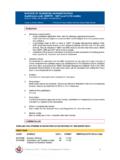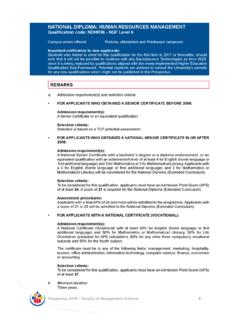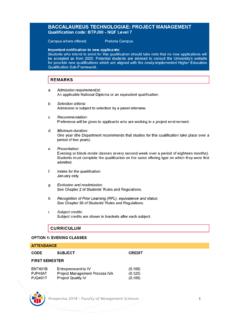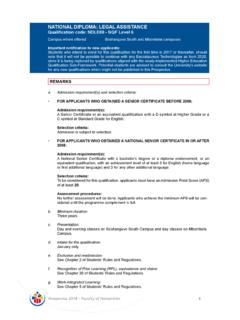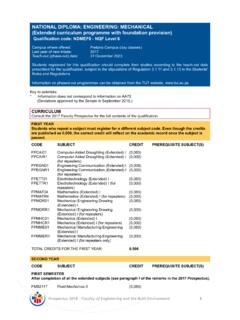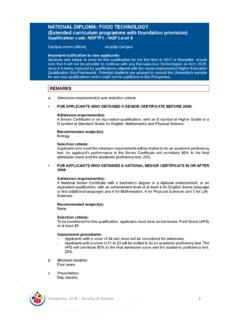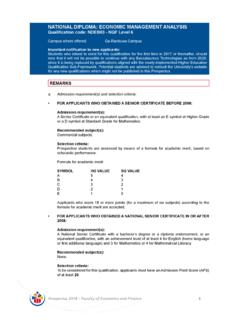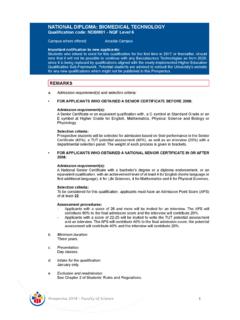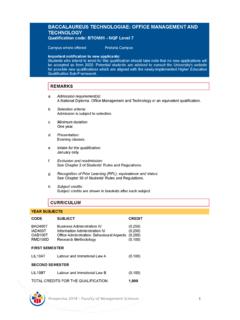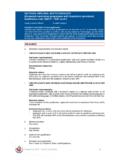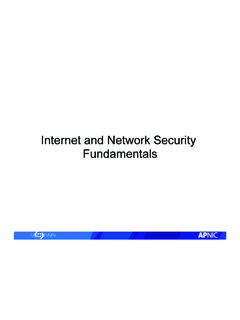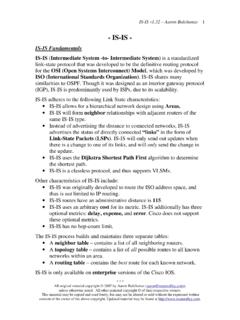Transcription of NATIONAL DIPLOMA: INFORMATION TECHNOLOGY: …
1 1 Prospectus 2018 - Faculty of INFORMATION and Communication technology NATIONAL diploma : INFORMATION technology : COMMUNICATION NETWORKSQ ualification code: NDIK12 - NQF Level 6 Campus where offered: Soshanguve South CampusImportant notification to new applicants: Students who intend to enrol for this qualification for the first time in 2017 or thereafter, should note that it will not be possible to continue with any Baccalaureus Technologiae as from 2020, since it is being replaced by qualifications aligned with the newly-implemented Higher Education Qualification Sub-Framework. Potential students are advised to consult the University's website for any new qualifications which might not be published in this Admission requirement(s) and selection criteria:See qualification NDIT12 listed under the ICT First Years and Foundation Minimum duration:Three Presentation:Day classes.
2 D. Intake for the qualification:January Exclusion and readmission:See Chapter 2 of Students Rules and Recognition of Prior Learning (RPL), equivalence and status:See Chapter 30 of Students Rules and Regulations. g. Industry Exposure IIIB (Work-Integrated Learning):Students may register for this subject only with the permission of the Head of the Depart-ment. See Chapter 5 of Students Rules and Regulations (paragraphs and ) for furtherinformation. h. Subject credits:Subject credits are shown in brackets after each subject. Key to asterisks:* INFORMATION does not correspond to INFORMATION in Report 151. (Deviations approved by the Senex on 22 June 2011.)CURRICULUMFIRST YEARP lease note that students will register for all first-year subjects under qualification code NDIT12, where they will be introduced to the basic principles of computers and INFORMATION technology SUBJECT CREDIT PREREQUISITE SUBJECT(S)FIRST SEMESTERCFS10AT Computing fundamentals IA* (0,125)CGS10AT Computing Systems IA* (0,125)2 Prospectus 2018 - Faculty of INFORMATION and Communication TechnologyCMK10AT Computing Skills IA* (0,125)DSO17AT Development Software IA (0,125)TOTAL CREDITS FOR THE SEMESTER: 0,500 SECOND SEMESTERCFS10BT Computing fundamentals IB* (0,125)CGS10BT Computing Systems IB* (0,125)CMK10BT Computing Skills IB* (0,125)DSO17BT Development Software IB (0,125) Development Software IATOTAL CREDITS FOR THE SEMESTER: 0,500 TOTAL CREDITS FOR THE FIRST YEAR.
3 1,000 SECOND YEARCODE SUBJECT CREDIT PREREQUISITE SUBJECT(S)FIRST SEMESTERCOB20AT Communication Networks IIA (0,125) Computing Systems IBDSA20AT Distributed Systems IIA (0,125)IIE20AT IT Electronics IIA (0,125)ITT10AT IT Mathematics IA (0,125)TPG12AT Technical Programming IA (0,125) Development Software IBTOTAL CREDITS FOR THE SEMESTER: 0,625 SECOND SEMESTERCOB20BT Communication Networks IIB (0,125) Communication Networks IIA IT Mathematics IADSA20BT Distributed Systems IIB (0,125) Distributed Systems IIA Technical Programming IAIIE20BT IT Electronics IIB (0,125) IT Electronics IIAITT10BT IT Mathematics IB (0,125) IT Mathematics IA TPG12BT Technical Programming IB (0,125) Technical Programming IATOTAL CREDITS FOR THE SEMESTER: 0,625 TOTAL CREDITS FOR THE SECOND YEAR: 1,250 THIRD YEARCODE SUBJECT CREDIT PREREQUISITE SUBJECT(S)FIRST SEMESTERCOB30AT Communication Networks IIIA (0,125) Communication Networks IIBCOB30BT Communication Networks IIIB (0,125) Communication Networks IIBDSA30AT Distributed Systems IIIA* (0,125) Communication Networks IIB Distributed Systems IIA Distributed Systems IIBDSA30BT Distributed Systems IIIB* (0,125) Communication Networks IIB Distributed Systems IIA Distributed Systems IIBIDC30AT Industry Exposure IIIA (0,125)TOTAL CREDITS FOR THE SEMESTER: 0,6253 Prospectus 2018 - Faculty of INFORMATION and Communication TechnologySECOND SEMESTEROn completion of all the above subjects.
4 Students with only one subject outstanding may be allowed to register for that subject and Industry Exposure IIIB with the approval of the Head of the Industry Exposure IIIB (0,125)TOTAL CREDITS FOR THE SEMESTER: 0,125 TOTAL CREDITS FOR THE THIRD YEAR: 0,750 TOTAL CREDITS FOR THE QUALIFICATION: 3,000 SUBJECT INFORMATION (OVERVIEW OF SYLLABUS) The syllabus content is subject to change to accommodate industry changes. Please note that a more detailed syllabus is available at the Department or in the study guide that is applicable to a particular subject. On 23 August 2017, the syllabus content was defined as follows: CCOMMUNICATION NETWORKS IIA (COB20AT) 1 X 3-HOUR PAPER(Subject custodian: Department of INFORMATION technology )This subject covers various aspects and technologies involved in data communication and networking.
5 Students are introduced to topics such as network topologies, transmission fundamentals , contention protocols, data compression techniques, data security and integrity, flow-control protocols and the various IEEE standards. The emphasis is on giving students a sound understanding of local area networks (LANs), although aspects of wide area networks (WANs) are also covered briefly. (Total tuition time: 80 hours)COMMUNICATION NETWORKS IIB (COB20BT) 1 X 3-HOUR PAPER(Subject custodian: Department of INFORMATION technology )This subject equips the student to install, configure, operate, and troubleshoot medium-size routed and switched networks. Topics covered include Switched and Routed Networks, Static and Dynamic Routing, IOS, IPv4, IPv6, RIP (Routing INFORMATION Protocol), single area OSPF (Open Shortest Path First), VLANs, VLSM, DHCP (Dynamic Host Configuration Protocol), and ACLs (Access Control Lists).
6 (Total tuition time: 80 hours)COMMUNICATION NETWORKS IIIA (COB30AT) 1 X 3-HOUR PAPER(Subject custodian: Department of INFORMATION technology )To provide a practical survey of network security applications and standards. The subject covers concise survey of the cryptographic algorithms and protocols underlying network security applications, network security tools and applications, and system-level security issues. (Total tuition time: 80 hours)COMMUNICATION NETWORKS IIIB (COB30BT) 1 X 3-HOUR PAPER(Subject custodian: Department of INFORMATION technology )This subject covers various aspects and technologies involved in wireless and mobile networks. Students are introduced to topics such as ad-hoc network, wireless routing protocols, vehicular area network, wireless sen-sor networks, IEEE (WLAN), Bluetooth, GSM network, handoff and roaming, channel allocation, and satellite systems.
7 The subject is aimed at giving students a solid understanding of wireless networks, mobile systems and satellite systems. (Total tuition time: 80 hours)COMPUTING fundamentals IA (CFS10AT) 1 X 3-HOUR PAPER(Subject custodian: Department of Computer Science)The student is introduced to the fundamentals of computers and INFORMATION systems, computer organisation and data processing. (Total tuition time: 90 hours)COMPUTING fundamentals IB (CFS10BT) 1 X 3-HOUR PAPER(Subject custodian: Department of Computer Science)The basic concepts of system development, data management, management INFORMATION systems, ethics, privacy and security, purchasing and maintaining microcomputers, number systems and binary logic. (Total tuition time: 54 hours)4 Prospectus 2018 - Faculty of INFORMATION and Communication TechnologyCOMPUTING SKILLS IA (CMK10AT) 1 X 3-HOUR PAPER(Subject custodian: Department of Informatics)This subject aims to equip the student with fundamentals of IT Soft skills for both the ICT industry and other working environments upon which a successful career can be built.
8 In addition, it will also improve the student s relation and interaction abilities needed within the dynamic ICT industry. The student who successfully com-pletes this subject must identify and implement various thinking skills and learning styles, state the legal and cultural sensitivity issues of IT, identify and explain the variety of soft skills including study skills and strategies, research, presentation as well as communication skills, and identify and explain interpersonal skills in relation to character, time management and team building dynamics and conflict resolution. (Total tuition time: 60 hours)COMPUTING SKILLS IB (CMK10BT) 1 X 3-HOUR PAPER(Subject custodian: Department of Informatics)The aim of this subject is to extend the skills in CMK10 AT so as to improve on student s relations and inter-action capabilities that will be applicable within the dynamic ICT industry and the external environment.
9 The student who successfully completes this subject must describe, distinguish and portray changes in terms of personality profiles, emotional intelligence, self-management, stress management and relationship manage-ment; identify and apply the notion of team dynamics; deal with conflict and understand the dynamics behind change; report on effective correspondence; produce meeting documents; conduct meetings; and demonstrate the required communication skills to develop interpersonal business relationships through by means of group work. (Total tuition time: 60 hours)COMPUTING SYSTEMS IA (CGS10AT) 1 X 3-HOUR PAPER(Subject custodian: Department of Computer Systems Engineering)Introduction to hardware, operating systems, motherboards, processors, memory, hard drives, installing and supporting I/O devices, multimedia devices and mass storage, PC maintenance and troubleshooting strategies, and installing and maintenance of Windows.
10 (Total tuition time: 54 hours)COMPUTING SYSTEMS IB (CGS10BT) 1 X 3-HOUR PAPER(Subject custodian: Department of INFORMATION technology )Provides the foundation of data communications and local area management, OSI model and/ or TCP/IP protocol stack model, data transmission principles, media, major protocols, topologies, routing methods, introduction to networking principles and network operating system fundamentals . (Total tuition time: 54 hours)DDEVELOPMENT SOFTWARE IA (DSO17AT) 1 X 4-HOUR COMPUTER-BASED(Subject custodian: Department of Computer Science)Aim: To learn to solve problems using the basic programming principles, and then practically apply that knowledge in C++. OBJECTIVES: To enable the student to understand problems and know how to solve them by using a computer; understand the general concepts and arithmetic used in programming, sequence, selection and iteration control structures and a variety of built-in data types, including strings.
